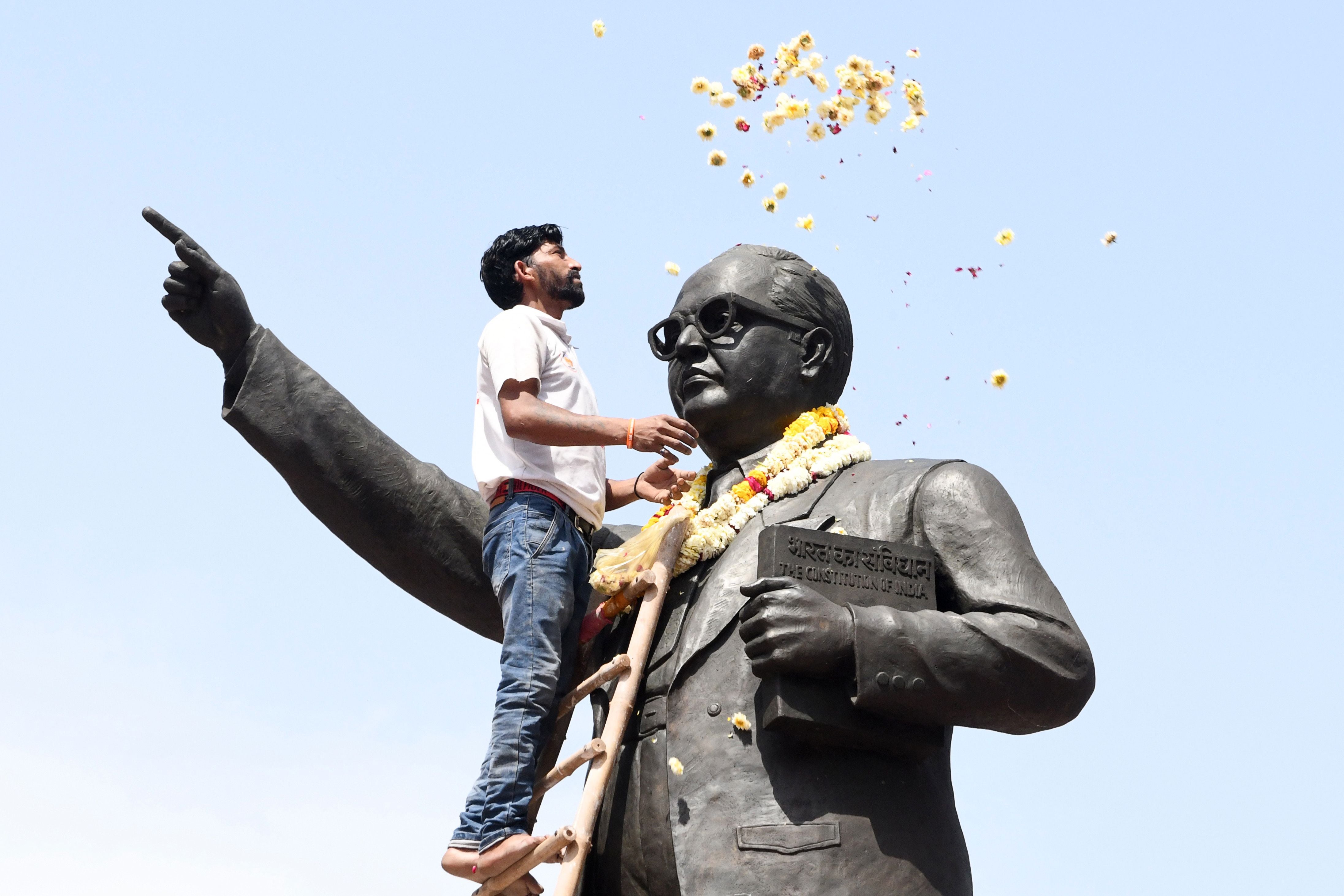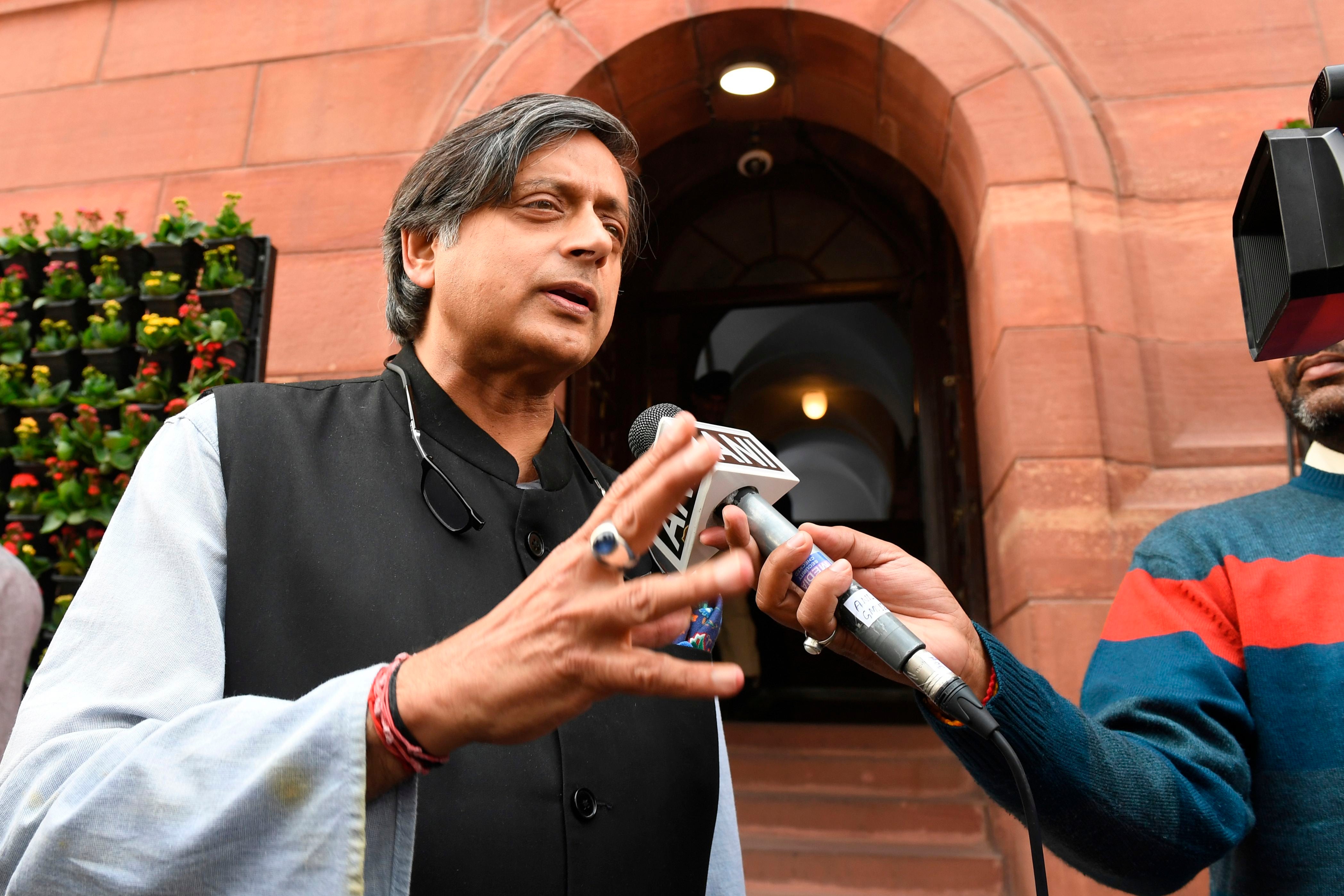The Independent's journalism is supported by our readers. When you purchase through links on our site, we may earn commission.
Shashi Tharoor: Has India annihilated caste as BR Ambedkar sought? Clearly not
As caste discrimination bans prove controversial in the US, Indian parliamentarian Shashi Tharoor speaks to Arpan Rai about his new compact book chronicling the life and legacy of ‘the great emancipator of India’s Dalits’


When a 2012 poll asked members of the public to name the “Greatest Indian” of all time, 20 million people voted for a top 10 that includes iconic names like Jawaharlal Nehru, Indira Gandhi and Sachin Tendulkar. But the man who topped the list (Mahatma Gandhi was excluded for fears he would render the exercise pointless) is one who many outside India might never have heard of: Bhimrao Ramji Ambedkar.
Ambedkar’s remarkable journey saw him start as out as a member of the formerly “untouchable” Dalit community, historically among the most oppressed in the Hindu system of caste, to become one of the founding fathers of independent India’s constitution.
This “curiously bloodless tale” of a freedom fighter whose life and legacy remain mired in controversy is the subject of a new book by the MP and author Shashi Tharoor, who has previously written a well-received bitesize biography of Nehru, India’s first prime minister.
Sitting down with The Independent in Delhi ahead of Dalit History Month – observed every April since 2011 – Tharoor explains that he wanted to deliver a digestible version of Ambedkar’s story “for the TikTok generation”.
“There’s an extraordinary mythologising of an individual who in his own lifetime was a figure of controversy and contention, who lost more elections than he won and [underwent] this transformation,” says Tharoor. “It struck me that he lived to the age of 65. I had this idea 65 years later as I thought, what a perfect moment to look back on his life.”

Tharoor’s book is divided into two parts, with the first focussing on Ambedkar’s life as a revolutionary against the Hindu caste system into which he had been born on the lowest rung. “To be born an untouchable in nineteenth-century India was to be consigned to the depths of human degradation,” Tharoor explains in the first chapter.
Tharoor details the extraordinary challenges of Ambedkar’s early life, including his marriage aged just 15 to a nine-year-old girl, and that he went on to lose four of his children as poverty plagued his young family. Working his way up through the education system, Ambedkar saw the limitations imposed on him by caste discrimination when he was kicked out by a landlord and beaten by neighbours after they discovered he was from an “untouchable” background.
In the second part of the book, Tharoor recounts Ambedkar’s contributions to India’s independence movement, which saw him often ideologically at odds with and criticising Mahatma Gandhi, and his role in writing the nascent country’s constitution.
Tharoor also addresses the inevitable questions that will arise about his own suitability, as a man born into a privileged upper caste family, to be a chronicler of “the great emancipator of India’s Dalits”.
While Tharoor has written a book entitled Why I Am A Hindu about his pride for his religious identity, Ambedkar described “Hindu society” as a menace upon liberty, equality and fraternity. In 1956 he turned to Buddhism, calling it the “most scientific religion”.
“I will not protest, as I once did, that I have grown up oblivious of caste, because I have since been schooled to accept that even caste-blindness is a reflection of privilege,” Tharoor declares in a preliminary note in his book.
Expanding on this in an interview, he insists that caste finds no place in his interpretation and practice of Hinduism and Hindu belief. “I have never practised the caste system, I have never believed in it and I never ask someone what their caste is when someone wants to come and apply for a job as my cook. I have never asked the caste of any of my cooks or anyone serving in my house and office,” Tharoor says.
“I was a child of the generation of nationalist parents who believed, like Nehru and Ambedkar, [that] you don’t talk about caste. No caste was mentioned in my house when I was growing up as a child.”
India banned caste discrimination in 1948, but stigma and divisions remain and the country continues to struggle to right the wrongs of historical inequality. Recent efforts in Seattle and California to enact their own specific bans on casteism have proved controversial, with some arguing that it singles out the Hindu community as having a particular issue with discrimination.
But those who have endured the ongoing oppression of the caste system question Tharoor’s argument that it does not exist in his version of Hinduism. “If Tharoor says the caste system is not central to Hinduism, we need to ask him how he defines Hinduism. Are Sanskrit texts like theVedas, Dharma Shastras and Puranas a part of his idea of Hinduism? If yes, those texts are blatant in their endorsement of the caste system,” says Tejas Harad, founder-editor of The Satyashodhak, a progressive magazine.
“Many temples, such as the Jagannath temple in Odisha, even [today] do not allow Dalits to enter. Will Tharoor say that these temples are outside Hinduism? Is Hinduism without the caste system possible? Maybe. Does such a Hinduism exist right now? The answer is an emphatic no,” says Harad.
The ongoing discrimination of Indians based on caste is “revolting”, Tharoor says. Even the process of “caste consciousness” – acknowledging the problematic existence of the caste system – began “[with] politicians as a very useful element for political mobilisation… they used caste to appeal to people’s identity” and thereby win votes.
“Has it changed fast enough, have we essentially annihilated caste as Ambedkar had sought? Clearly not,” he says.
Aside from being a prolific author, Tharoor’s role as an MP for the opposition Congress party pits him against the present-day Hindu nationalist government of Narendra Modi. The most recent official crime figures indicated that, as of the end of 2021, more than 71,000 cases of caste-based crimes against Dalits were filed but still awaiting trial.
“I am not happy with anything to do with the current administration. But on this issue, they’ve been fairly cynical in their attempt to co-opt the Dalit vote just as they’ve been cynical in their attempt to co-opt every caste interest in this country,” says Tharoor.
“I can’t say that I can point to any specific, genuine accomplishment of this administration [for] Dalits. I have mentioned how the ruling Bharatiya Janata Party (BJP) now celebrates Ambedkar Jayanti (birthday) but how essentially fraudulent it is to claim to embrace Ambedkar when they are denying, as it were, every single thing that he’d said about Hindutva, Hinduism and Hindu Raj,” he goes on.
If caste-based crimes are happening at such a high rate and the government is not doing enough for Dalits, as Tharoor argues, then what has progressed in the more than 66 years since Ambedkar’s death?
At the very least, he argues, Indian society is more aware and open to discussions of caste issues now than they were when Ambedkar died. “They’re more conscious now,” he says.
Tharoor’s book ‘B. R. Ambedkar: The Man Who Gave Hope to India’s Dispossessed’ will be published in hardback in May 2023
Join our commenting forum
Join thought-provoking conversations, follow other Independent readers and see their replies
Comments



Bookmark popover
Removed from bookmarks